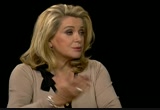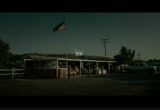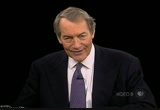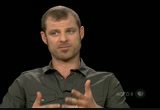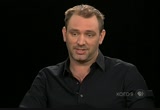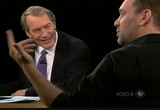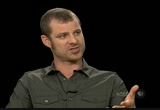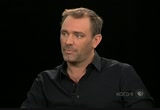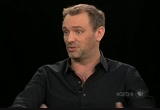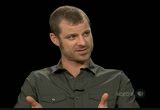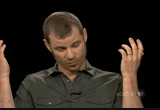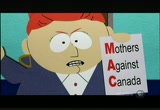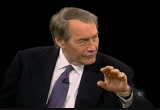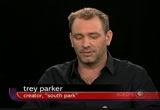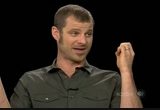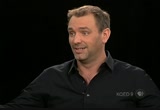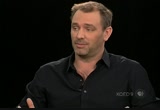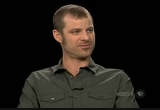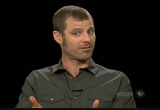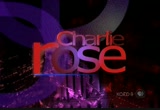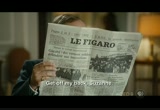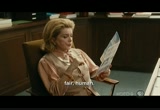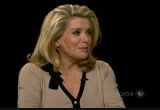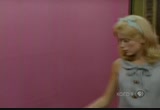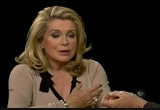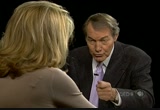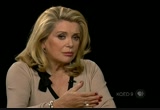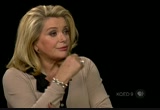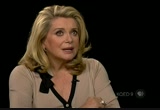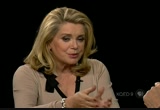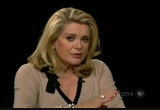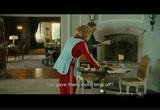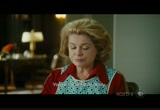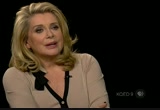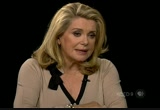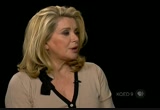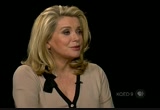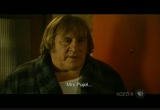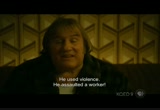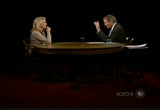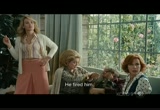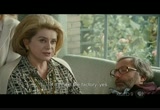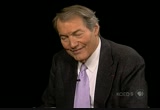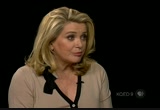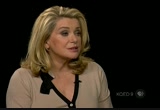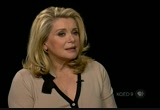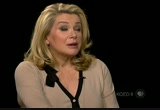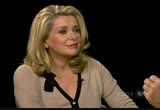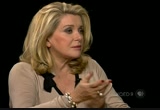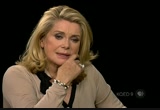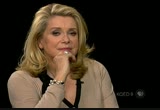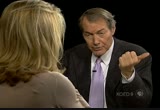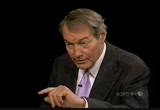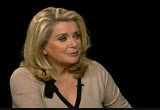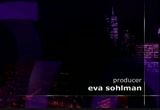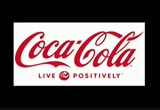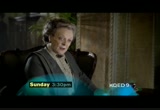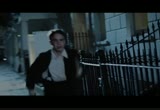tv Charlie Rose PBS March 26, 2011 12:00am-1:00am PDT
12:00 am
>> rose: welcome to our program, we begin this evening with matt stone and trey parker of south park fame. and their new broadway musical, the book of mormon. >> we kind of wanted to do something about mormon ism but make it pro mormon. that's when we knew that that this partnership with bobby would work. because we wanted to do something that was like-- i don't know, that made sense to us. we never considered ourselve anti-religion or anti-mormon. other people do. >> it is not like we were sitting here saying let's rip on mormon, how should we do it let's start writing some songs. it really was for me, growing up with musicals, i loved the classics, all the roger and hammerstein stuff. and so it really was can we make a really solid traditional musical and in the same way that they would use a group from oklahoma. now we are chalking being
12:01 am
chinese americans, no let's do a really traditional musical but with mormons. >> rose: and katherine deneuve about her new thing potiche. >> the actresses, they want to have in the film or they want to say, you know, get through the actors, that's how it works. and it's the first important decision they have, if they are right, of course, it is to the choice of the actors. because in the end, on the screen that is what you look at and that is what you har and the emotion you can get or the pleasure you can have, you know, is always -- >> matt stone, trey parker and katherine deneuve when we -- catherine deneuve when we continue. >> funding for charlie rose was provided by the following:
12:02 am
who beats the odds and comes out on top. but this isn't just a hollywood storyline. it's happening every day, all across america. every time a storefront opens. or the midnight oil is burned. or when someone chases a dream, not just a dollar. they are small business owners. so if you wanna root for a real hero, support small business. shop small. additional funding provided by these funders: captioning sponsored by rose communications from our studios in new york city, this is charlie rose.
12:03 am
. >> rose: matt stone and trey parker are here. in 1997 they created the television show south park about four foul mouth fourth graders. it is was an immediate hit. since its debut the show has attract both controversy and praise for take on comedic targets ranging from scientology to paris hilton. now stone and parker have written and directed their first broadway musical it is called the book of more monday. they call it their atheist love letter to religion. i'm pleased to have both of them back at this table. welcome. >> thank you. >> thanks for having us again. >> rose: my pleasure. march 24th is sort of officially -- >> it's crazy because we have been working on it for seven years and we don't work that long on anything it crazy to work that long on something and suddenly it just is done. >> rose: done, it's right. >> yeah, yeah, i don't know, its he as ripe as it is going to get. >> it's ripe. >> rose: what dow mean by ripe. >> i mean we're ready to, it is a full term thing.
12:04 am
>> rose: it has been nine months or nine years. >> yeah t feels like about a year and a half ago we have been working on it as our other project for a long time and we find about a year and a half ago we just have to do this or not. it's been a lot of work the last year and a half. >> i know you told this story before but tell me where this idea came from. >> well, in 2004 we were doing team america, this marionette puppy movie that we did. and we were in town, we were in new york city and scott ruden told us about this puppet, broadway musical called avenue q. and we thought, oh, no someone else did marionettes because we thought marionettes was such an awesome idea. >> yeah, so we went and saw avenue q and we both loved it. and we looked in the play bill and bobby lopez, one of the cowriters of it had thanked us. >> we didn't even know who he was or anything. we thought it was very weird to find ourselves in the play bill. >> why de thank you. >> what was crazy was we kept watching and we really loved the show. and i wanted to do musicals
12:05 am
since i was a kid. sos as it was getting done, we were both like this is the kind of thing, we should do something like this. and we-- and bobby was there that night. so we met him and we're like nice to meet you. and we have to ask, why are we in the play bill. and he said because it was the night that i saw the south park movie. and i said i want to do something like that. and so it was just this craze thing. and that night we went out and just started talking about you know what interested us. and mormons came up very quickly as it always does with does. and he had a big interest in mormons too. and it just seemed so natural to-- . >> rose: why does mormons always come up very quickly for you? >> it's just, for us ts was simple because growing up in colorado we are right next to utah. we knew a lot of mormons growing up. we had heard the stories. and you know, it was the same store he oochlt you heard about ufos, cattle mute mutilationses and mormons growing up in colorado. >> rose: so you said let's do a musical about mormons. >> yeah. >> rose: so you started writing.
12:06 am
>> we went and took a field trip to salt lake city. because we had been there a bunch but bobby had never been there. we went to salt lake city, we did tour group stuff, talked to a lot of missionaries. >> rose: this is great. so you go to placeses li the coffee shop and would you say to them, any missionaries here. >> yeah. >> me. >> no, we would be at a restaurant and be like oh, talking around ideas and we are like maybe one of the missionaries is kind of like-- hiding out the fact that he is maybe gay inside and talking to the waiters. do you know anyone who is in a mission who maybe is gay now. and they are like how many dow want. you know-- next thing we know we're talking to eight different people. >> rose: you had a story. >> post collegiate waiters in salt lake city, most of them had been mormons. >> rose: so you decide to do it not in salt lake but in uganda. >> the first thing we talked about, the first time we met bobby, the first thing that came count of all of our mouths was joseph smith the musical. and following joseph smith
12:07 am
from upstate new york to ohio and illinois and then eventually he dies there and the mormons make it salt lake city. and we just, we just started thinking we don't want to do a musical with covered wagons and that pioneer. we just don't want to do something. we wanted to do something more contemporary and got on to missionaries. because missionaries are how people-- that is a lot of people's first experience with mormons is they come to your door, ring your doorbell. and missionarieses have that job to tell you about mormonism. so that is how we got on this idea of doing something about missionaries. and then send them to a place on earth that is just the polar opposite of where they grew up in the suburbs of salt lake city. >> rose: and that is uganda. >> for us, we set it in northern uganda because of the humanitarian crisis there. but it is supposed to be that place on earth when you read about it you go, god, those poor people, can they get a break, they have this, this, they are poor, they have famine and war. >> rose: someone arrives to convert them. >> it was such a natural coming of age story because once we read about the whole
12:08 am
missionary story works, these young kids license, a lot go to the missionary training center in provo and spend several months learning the language of where they are going to go, and they are sent somewhere across the world or somewhere definitely far from home. and then they are paired with someone that is their companion that is their mate, you know. and it was like such an obvious broadway love story. here is our couple. you know. and so it just seemed like such a natural coming of age story that would fit so perfectly. >> rose: so why is this anatist love letter to religion? >> well, matt says that because i don't really consider myself atheist. >> rose: what dow consider yourself, a believer. >> i have no idea. well, a non-- more specifically a nonmormon's love letter to mormonism. it is like we just-- i think when we kind of wanted to do something about mormonism but make it pro mormon, that's when we knew that this partnership with bobby would work. because we wanted to do something that was like-- i don't know, that makes sense to us.
12:09 am
we never considered ourselves anti-religion or anti-mormon, other people do. >> it is not like we were sitting it there going okay, let's rip on mormons, how should we do it let's spend seven years, let's start writing songs. really, it really was for me, growing up with musicals, i love the classics, all the roger and hammer stein stuff. so it really was can we make a really solid traditional musical in the same way that they use a group from oklahoma, chinese americans, now we will do this. let's do a really traician diddal musical but with mormon. >> rose: so was writing the songs the hardest part? >> welling writing the songs was the main part and that was the big thing for us. we've done a lot of musicals now, actually. and it's always for this, for a real broadway thing we said it's got-- at the heart of it it has to be great songs. so instead of sitting down, we sat down and started talking about the idea and the plot and all that. and we just really made an album of songs first. >> rose: and built it around the songs. >> and we let the songs dictate where the show should go. because we wanted it-- we
12:10 am
didn't want to just write something and go back and fill-- . >> rose: do the songses have a beginning, middle and end. >> a lot of them are really plot songs that take you from here to there in the show. that's hard to do. but that is part of what we wanted. >> rose: why did it take so long? >> well, partly it took seven years partly because trey and i have a day job that we always have to leave and go do. we are to the going to give that up. but, yeah, but we, so we would do a week or two, you know. then put it down for four or five months and then do a week or two. and also bobby lives in new york and we live in l.a. so it is perfect-- . >> rose: you maintain continuity. in other words, you didn't have to sort of rev up to do it each time. >> no, because we kept recording the songs so we would always have the album was getting bigger. and we could have, let's get together and do another song. let's figure out so it was really kind of making the album. >> a few songs at a time. but it guess tated that long too. even though when we weren't working on it, i think we were thinking about it in the back of our minds. i think it is a lot better. >> rose: are you already thinking about another musical.
12:11 am
>> hell no. >> no, no. we're thinking about a baech. we need a vacation, both of us. we need a vacation. >> rose: because it's just hard work. >> yeah. >> rose: you have been doing too many things. >> it's hard work, this last month of going through previews and putting a thing on broadway, we've never been through that before. and it's been hard work but also emotionally intense. just being in the room with a thousand people watching something that you do, even though we do a tv show that 14 times a year on wednesday nights 2 or 3 million people see, it's something different about being in the room with those people and watching it, you know. >> there is something to like asking a woman who has just given birth, you know, dow want to do it again? give her a few weeks. >> rose: good point. take a look at this. this is a moment from the oscar nominated song blame canada. >> should we blame the government. >> or blame society. >> or should we blame the on tv. >> no, blame canada.
12:12 am
blame canada. for their baedy little eyes, blame canada, blame canada ♪ ♪ you need to form ♪ don't blame me ♪ tore my son sam, he saw the darn cartoon and now he's off to join the klan. >> and my boy eric had my picture on his shelf. ♪ but now when i see me tells me to [bleep] myself. >> blame canada, blame canada. it seems everything from-- canada came along ♪ ♪ blame canada ♪ they're not even a real country anyway ♪ ♪ my son could have been a doctor or a lawyer it's true ♪ ♪ instead he burned a pig on a barbecue ♪ ♪ should we take some action ♪ ♪ blame canada ♪ blame canada ♪ with all the hockey ♪ and the -- >> blame canada ♪ ♪ blame canada ♪.
12:13 am
>> rose: you got nominated for that, did you. >> got nominated. >> for the song but we lost to phil collins, the song you'll be in my heart. >> rose: beat this. >> beat this. so here's what, we are watchinging this, and you both are saying, we have gotten so much better. >> the animation in south park has gotten so much better. >> rose: is that because of the techniques. >> a lot of it is the technology has just gotten better. to render that in the commuter would take a day. you know. and now we could render something like that in about ten minutes. >> yeah. >> and we know what we are doing more now. we know how to frame shots, for instance, and do things like that. >> rose: is the core of it easier to do? >> no, no the core itself is-- . >> rose: what is the core, the story. >> the thing is that we still, we still want to do every episode ourselves. and so we still do exactly
12:14 am
what we did on the show from the beginning. and so we write -- and direct that. >> rose: you can't delegate. >> we just can't. and also wean't because we start on thursday age by wednesday we've got to finish show to put on the air. and so sometimes that thursday morning it's like we don't even have an idea. and so you can't really, unless we did all the voices and writing, we don't have time to go you take a pass at writing this scene and we'll look at it. it just has got to get done right then and there. it is this crazy intense goinging to battle for two months. but then it's done and we have just about killed ourselves but it is the way we have done it every season so we don't want to change it. >> rose: can you vacation. >> i would like to work on that a little harder. take better vacations. >> we have to go, we get to go-- opening night. >> rose: what happens on opening night. you go to the big party. >> we don't really know because we've never been to opening night of a broadway show so we're waiting to see what happens. then we get basically a week and we've got to be back at south park for that run. after that run, we're going to take a nice big vacation. >> we've been working going back and forth between south
12:15 am
park and this for a couple of years now and we need a break. >> rose: but is it as exciting today as it was from the begin organize less so because -- >> yeah, i mean at the heart of what, you know, some of the stuff like i guess seeinging yourself on tv, now we've done that. or seeing your work on tv there say little bit of, you know, we've been there done that. but i think the heart of when we get excited about a show still comes down to when we are in the writings room and we make each other laugh, really hard about something. and that kind of is exactly the same as it was when we were 19 or 20 years old. and then you know you've got something. >> rose: the elation of knowing something works as a joke. >> yeah, a joke, an idea or a concept. and like that's where we are like okay, that's great. and that still totally is exciting. >> rose: how about the moment when you went on jon stewart and he said i love it, i loved it. >> he is on the same network as us so i think he had to say that. >> no, i mean we actually saw him at intermission. and-- . >> rose: . >> we were in the preview. we had to sit and watch our show like 50 times in a row
12:16 am
every night. and so like and we knew he was there and he knew sort of where we were. and he came back just gushing even then. and we're like oh, it's cool that one like jon loved it that much. it proved that okay, and but even just the audience in general. you know, we don't get a lot of-- we get to finish south park in the middle of the night on an avid and put it out there and go to bed. then we can read on the internet what people thought about it but having this experience where we can be there at the back of the house every night and hear the audience laugh, is something we haven't gotten to experience very much. so it is pretty fun for us. >> rose: you two working together, has that changed? >> not the way we work together. >> no, not the way. it's always kind of different. like you know, it is always kind of changed depending on what we are doing. and a lot of times, like trey is director. and sometimes its, you know, producer director relationship amount of lot of times it is just a writing team relationship. sometimes we're going on charlie rose and it is two friend goesing on charlie rose, honestly that's the truth so it kind of changes depending on the situation. but i think it's because we come from our first things
12:17 am
we did was independent film. in an independent film you just do it you just get the camera and somebody picks up the came and somebody do that dow it first and figure out what you call that later, you know. and that has kind of always been our ethic and served us well. >> rose: how long have you had a relationship with scott rubin. >> we've had a relationship with scott rubin since-- actually it was-- no, it was funny. we did in college we did a musical called can balance the musical it was sort of just like a student-- really a senior thesis film. and he saw that. he was already kind of a very big shot at paramount. and he saw that little independent film. and called us in and we were sitting there in his office in ar paraa mount right out of college and just going-- and he right away was like i want to work with you guys. and we're like, okay, you know. and then we started working on something. and then we're like well, we got this thing, we can do this tv show. he is like why would you
12:18 am
ever want to do a tv show when you can do a movie. it was pretty funny. a tv show will never be that big. yeah, but it is a thing called south park, we're going to do six episodes and be done with that and then we can do a movie. >> rose: is he the person in your guy's professional life who will say this doesn't work,. >> that's all he says that is what he does this is not funny. can you do better. and he came along at i appoint in our life in the south park movie where we really needed to hear that we were like the new stars in town. and he was like the one guy-- just anything you do is funny and every executive tells you are you funny and great. and scott is like that's not good. wait, what. he is also the person going you know you can do better. for me, else's always been i really love nfl football. and so i always liken him to like bill parcells or that kind of football coach where he does kick our ass. he kicks our ass and doesn't let us be lazy but if he end of it after you won the super bowl are you like thanks for kicking our ass. >> rose: like a tiger mom,
12:19 am
he is. >> yeah, it is always trey and i and our producer who does everything with us. we kind of feel like when we bring something to him, he instantly visualizes it at the highest possible level. and that is something that is like comedy doesn't get that treatment in hollywood it is always ghettoized to like okay, get some funny stuff in there. >> he sees it like we should make something great out of this. he sees the potential of something that is good. >> yeah that is actually a great piece of art instead of just f action rt jokes. which we think they can be both. >> can they really be art. >> oh, yes. >> we made a lot of money off of that. >> so what are you dreaming about. what, i mean you have done a musical. you've done the movie. you've done the tv. >> i have been told other people are gung for your job but when are you ready to hang it up i would love it to be the charlie rose show with matt stone. >> he has been talking about that for a long time. >> rose: have you really. >> yeah, yeah. >> rose: would you keep the way i do it, at the table with a black background.
12:20 am
>> yeah, the charlie rose show starting matt stone. >> the charles's rose-- it would still be your show. >> rose: i'm ready to retire. let's make it happen. i'm goinging to bali. if i don't come back, it's you. >> welcome back to the charlie rose show. >> with matt stone. >> how was your trip to bali. >> i'm matt stone. >> rose: just think beaches. this is great. thank you for coming. >> cool, thank you. >> it was really fun. >> rose: catherine deneuve is here, without her french film would be very, very different. acting she say is working with people who invite you into their dreams and trust you with their inner most being. her enduring career is defined in large part by her collaboration, many of films most masterful director. roman polanski's repull shun and of course-- there was also her triumph in the last metro, and eight women.
12:21 am
12:23 am
>> . >> rose: i'm pleased to have catherine deneuve back at this table, welcome. >> hello. >> rose: congratulationses on this, not only this film but also this big retrospective. are you prepared to go and look at all of these films that have been defined by you and this extraordinary -- >> when you say it like that, i'm not sure i'm prepared. because it seems like a big responsibility. i take it as a very honor to, you know, i think it's the first time it's goinging to-- it's the first time for me, actually, it's having to have a retrospective and i saw the choice of the filmsnd i'm very pleased with it i think will travel in some other cities. so yeah, it's very nice for me. >> rose: there is not one film you like more than the other? >> there are several films i like more than others because i have been doing films for over 40 years.
12:24 am
so you can imagine in the 100 films i've done, i have some preferences, you know. but-- . >> rose: what preferences do you have? >> i have-- well, it is easy to say but it's true, you know, that-- will always be for me such an important film for-- because of what happenses to me when i met jack, because of the fact i was not sure i would become really an actress. i was quite young at the time. and it is really the meeting with him and the relation in work i had with him that really was very important for me. and i love the film, it's true. but i also met very important directors for me later. and i like very much the sovage which is a comedy i did. like last metro,. >> rose: the best thing an actress can have, or an actor, ask to be associated with talented people. >> that's why i said, you know, i always said that is was very lucky because i had the chance to work with very
12:25 am
important directors, very young. and when you meet directors like that, you know, like i had a chance to work with jack demmy or polanski, quite young, it is very good, it is like very good formation, you know to have that. >> rose: it's a good educational experience, a learning experience. >> education, exactly. i learned to film with them, you know. >> rose: and different things from each one? >> yeah, very different. very different because jack was a sort of modern poet who wanted to see the world like through colors and through situations that were always very romantic but in the same time very melancholic, you know. and he could always have that passing through music, you know, and words and music that did make a big difference. he had really his world, you know, like very special directors. he had really when you see his films you know there is something that you recognize from him.
12:26 am
>> it is also sayings something about you that they all wanted to work with you. it's a ta-way street. >> well, yes. it's true. i was chosen but also i suppose because of the interest, i had in the work that those directors had, you know, made. and -- >> but directors tell me that beyond the story they have, beyond the text, beyond the script, by far the best, most important thing for them to do is choose the actors. >> yes, because the actors are the interpreters, and everything they want to have in the film or they want to say, you know, get through, the actors. that's how it works. and it's the first important decision they have to make after writing the script if they are right, of course, it's to the choice of the actors. because in the end on the screen that's what you look at and what you hear and the emotion you can get or the pleasure you can have, you know, is always proactive
12:27 am
rrz why do you think you have been able to do this for so long, hundreds of films? >> sometimes i wonder. i wonder because it's not a decision, you know, it happens or it doesn't happen. so i suppose at some turning point and i'm not sure i saw those turning points happening, i was appealed to to neat or to do work with directors, maybe i wouldn't have worked with before. i don't know. i think i have the impression that i was looking for example, when i did at a certain age we see the turning point for actresses especially in america around 40. i did last metro and say that when he wrote that film for me, that he wanted to give me a part of the woman with responsibilities and i know the history of france
12:28 am
or he wanted me to have responsibilities and to have an input, of work to do. and it's true that happened at a time where it sort of changed the direction because before that, hi done other films. but at 40 you change a little. it's not all of a sudden at 40 you change but you have to have this evolution of a woman who is always the mistress, the young woman, the romantic character, to become a sort of more adult person and to be involved in other kind of parts, you know. >> did you welcome that transition. it gave you an opportunity to do different things and different rolls. >> i think i was able to understand and realize in time when i had to bend, you know, in one direction. i never had to make a very sort of strong turn. but i was aware enough, i think of who i was, and how i looked, you know, and the kind of things i would appeal to do as well, to follow a sort of stream
12:29 am
of-- a natural stream, you know, of age and evolution. >> this film has a very interesting character. yeah. >> tell me about her. >> well, she's, it takes place in the '70s because francois, he wanted to do this comedy that is-- that was directed from the play from two very known play writers. they wrote this play for a very famous comedian in france which i knew, which died ten years ago which i of love. sow wanted to adapt this play and i think he got the idea after-- he wanted to do the play but he was not sure how he could do it and until there were the elections sort of the election we had, you know, the the presidential election. and then he saw in front of sarkozy, the candidates for
12:30 am
the first time, in france there was a woman candidate. and when he saw the debate on television and also the last debate they had before the election, he said that's it. i want to do potiche. >> i'm familiar with those debates. sarkozy won most all of them and she it not perform as well as people expected her to. >> exactly, exactly. but then he realized in that moment that he could do a film about it and put it in this period of time before. because to make the opposition to know woman taking sort of revenge, you know. >> so that brings us to this story. >> yes. and that's when he decided that he was going to adapt the play to have it written for this period of time in the '70s. and he-- i said yes immediately. >> have you had the opportunity in most of the roles and this one included to say to yourself, now i'm goinging to help this director define this character because i have
12:31 am
specific ideas about who she is. relating to my experience or what i know. >> it's not exactly like that. i think, i saw the possibility to do that thing with france. hi worked with him before. and i know his films. i know how he works. and it's more like i want to be part of it, you know. i want to be part of this project and follow him. and i knew that i could bring something because he's very-- sometimes the way he turns things on a certain side. and i knew that i would bring a sort of humanity that he was not sure before how he wanted things to be more emotional than funny in a way. >> right. >> and actually didn't know when he wrote this that it would be so emotional. >> but when you read the script you knew or didn't know. >> we didn't really know until we started to work. that is more in those sceneses that we realized it's more emotional than he
12:32 am
12:34 am
to the play, you say. >> yeah. >> rose: it's the story of a woman who assumes the responsibility to run a factory. >> uh-huh. >> rose: i read somewhere that you thought about margaret thatcher as a kind of model. >> when i spoke when we were preparing the film he has, he located some woman, you know, also for the appearance, you know, the look. so we had in mind, yes, margaret thatcher, before that with jacques chirac or even-- for the last piece at the end when she speaks to the people after the election. so but those were only first time more than anything else. >> rose: tell me about your interest and your involvement in politics. >> i think it's very, i mean i'm very interested in politics, yes. i read a lot of newspapers and yes, i'm interested in politics because i find it, well, would be very difficult for me today not to follow the news not only
12:35 am
in france and europe but in the world, yes, i'm very into it, to understand to try to understand what happens in the world, yes. >> how do you think your president is doing sarkozy? >> i don't like too much because we are in a very difficult time at the moment, you know. the president is very low in the polls, yes. because of what happened in, so it's very difficult. and anyway i never really answer to political questions on television or even in newspapers. because what actors say, you know, can always become something else. and it's very private for me. if i had dinner with you, i would answer without any problems. you know, but i mean, you know what i mean, i don't take much-- i don't like to say too many important things. >> but to know you, you've got to be fascinated by what's happening in the middle east, now. >> of course, yeah. >> and what is happeninging in tunesia and egypt.
12:36 am
>> very impressed because people knew and even the people in europe, you know, knew and even the people responsibility today without knowing exactly at which point, you know, the level of life of people because as it's been said in newspapers, you know, and magazines, that people were scared. people mr. scared of the islamist muslim which is a sort of scare crow all the time, you know, to sort of make people, you know, afraid and then take the decision. but it's been very impressive to see the-- with which it sort of went from tunesia to libya. it's very -- >> a very dangerous moment in libya. >> yeah, it is very dangerous but dow realize that all those people in the responsibility and in those countries were there for more than 30 years. you cannot imagine. it's not normal. it's not. >> have you in terms of your career done almost
12:37 am
everything you wanted to do? >> i cannot say i agree with everything today, you know, but at least i know i didn't do things i didn't want to do, really. i know i have done mistakes. >> but they were not because you -- >> or even the experience of the shooting or the relation i had with the film finally when we did the film was not that good. that happened to me and it happened to me a few years ago which is my son was sad because i saw that after the experience i have, that kind of-- that kind of situation shouldn't happen to me because i should know better, you know, before i start. even if the result is not what you think, that is something else. but at least not to be wrong at the beginning on the choices. but as i said at least i know that i didn't do things i didn't want to do. >> set this up. are you meeting with maurice bobon played by gerard depar due. tell me, set the scene up for me. >> the scene at the beginning of the film where it is quite a secret what i have been living because i
12:38 am
had aloud affair with that man and nobody knowses in my family. so it is sort of secret meeting. and during my visit to him gi to see him at night in his apartment and we are going to say things, i'm going to tell him things about what i expect from him it will-- but we say something else underneath, you know. it's something else.
12:40 am
>> rose: it you sfraeded just one-- if you needed one reason to see this it would be to see the two of you together. >> together again, he is a wonderful partner, really wonderful to work with. >> rose: who else have you loved being with, that have that sort of magic. >> i like very much to work with daniel-- we were playing two characters, sister and brother and that's quite unusual at our ages to play relational sister and brother in our film. and i liked that very much. i like him as an actor but i
12:41 am
12:42 am
>> this is a story of emancipation. >> well, yes, because you know, these characters, this bomb probably she didn't even know she had that capacity. >> the ability to run a factory. >> yeah, but she likeses people. she's moved. she tries to understand or she takes the right decisions and it seems to work because she has good relation with people. she's a nice person. >> yeah. >> and then her husband comes back. >> yeah. >> and he wants back.
12:43 am
>> yeah. but she doesn't want to get back. >> doesn't want to give it up. >> yeah, because you know because she is gone the relation with new people and the way the factory is going, is doing well. so she discovered something and she doesn't see why she should give it up. she discovered something very knew. >> which was about herself. >> about herself and the relation to people. shes was much more afraid before. she was shy and always shut down by her husband or daughter, you know, it's only with the son that she had a better or nicer relation. she has discovered something and she doesn't want to give it up. >> the film is also about unions and workers, right. >> yeah, absolutely. >> and he plays, gerard plays -- >> the responsible party. >> but without wants to be mayor. >> yes, he wants to be pair because he wants to, you know, have powerness the power and the power to change the life of people to make their life better. that's always what they say, in politics, don't they. >> they do, yes.
12:44 am
>> that is what politicians say. >> they may want power but the reason they may want power is for themselves or they may want to per because they want to change things. >> i think when people have been in politics for such a long time, you know, it's such, are you taken by it, and i suppose you don't see any, in the end i don't mean you lose, i don't think they lose, you know, the fact that they are supposed to think of the best for people in that country but i'm not sure that is what they can do when they have the power, finally, they have much more other things to do. and decisionses to make. and but at the beginning, everybody in politics wants to, supposed to have the power to make life better. >> the former-- cecilia sarkozy, the wife of the president of france famously said after he was elected, it is like someone being given a violin is being given a strad varruous because he has want pod we are for such a long time, most of his life. and now he'll have the power
12:45 am
and a chance to do all the things that he imagines can do. >> that he imagines. >> in other words, france in his hands was like a stradivarius in the hands of a violinist. >> yeah, but i suppose people who were in play like he was almost all his life since he was 18 or 19, there is no other way, you know that is -- his goal was to reach this place, with si inkrebld, you know, to be able to become the president. now it's to be a president is something different, that you become a president, to be a and leave around the countries that's something very -- >> how many presidentses have you known. >> a lot. >> well, yes, i know. chirac for share. >> chirac for sure. >> pompedu. >> when i was young, yes. >> of course, yes. >> did you know de gaulle. >> well, yes. >> you met him. >> no, i didn't meet him. >> but you knew of him. >> the first i met was
12:46 am
pompidu. >> add madame because they were very different. because i was never really very keen to go to the elysse. and when i met-- it was on the private, i think the first time i went there was for, to have lunch with francois hitter and. >> yearly you hit errand who love culture as much as any french president and theatre and acting. >> yes, exactly, yes. >> rose: was he your favorite? >> he was my favorite yes, i think so. >> rose: what is amaze being paris, i have said often, it is a small town. people in politics and in theatre and in business and in art all come together, you know, if you go to dinner in france if will be a reflection of the entire society. >> you don't have this impression in america. >> rose: not as much, no. >> they don't mix the same. >> rose: new york is primarily a media and financial place and culture.
12:47 am
washington is a place primarily of politics. >> yeah. >> rose: and los angeles is a place primarily of cinema. >> true. >> rose: but france is different. >> because paris is the center and it is true, as you said f in america there is new york, washington, and loss ands less. >> rose: you haven't had a hollywood career. >> no. because it didn't happen. it's not that i turned it down. >> rose: that's my point. did you turn it down. >> no. >> rose: or just those -- >> who would turn down, you know. it's just that the film i z i liked it very much. but i suppose they were not successful enough for having, you know, proposition interesting enough for me to come back here in the states, frankly. s that's the main reason. i love the film i did. the film i did with bert reynoldses or even the film i did with jack lemon, april 4th. i liked the film very much. but it was not the big success that would-- . >> rose: do you know why? >> well, i suppose because after i did the film i went back to europe and i-- .
12:48 am
>> rose: exactly. >> if the film had been very important and very successful financially, maybe i would have had more interesting proposal. but that was not the case. and anyway, after the shooting i wanted to go back to france because hi my children and i wanted to be with them. but it's not that i had to give up anything, you know. it just happened that way. >> rose: it is said that you live a reasonably quiet life. >> it's true. extravagant and quiet and private. >> rose: and private too. >> yes, very private. >> rose: quiet and private. >> yes. >> rose: why is that your choice? >> private, especially. >> because i like to do thingses that are not obvious, you know, maybe for people who know me just like that no more. >> rose: you don't want to be a celebrity, you want to be -- >> yes. and if i want to do extravagant things i want to be able to do it without having to care and catch watch. if i want to do special things like i want to-- i don't want to have to make big effortses to live the
12:49 am
way i want to live. >> rose: has beauty been totally a benefit or is there some burden with beauty. >> there's always a burden to everything. i suppose there is a burden to buttey but less than the other way around. so you know, i cannot complain about that. >> rose: you would rather have it. >> i didn't choose t it happened and i cultivated what i could, you know, and happened what happened. i don't mean that i'm just around and things happen to me and i decide. but i did choices. i made choices, you know. and i suppose i was lucky enough to make choiceses that were right for me. but also because i followed my instinct, you know, my nature. and when i say, for example, i'm private it's because it's my nature. it is not that i have things to hide from people. but my nature is to have a private life with friends who are not in cinema and things like that. and also in writing or technicians in films. but i don't want that to be on the public place. it's not-- i'm not the president of france.
12:50 am
i don't want to live publicly. i don't have to. >> rose: have you written a memoir of your life. >> no. >> rose: will you. >> no. >> rose: why not? >> why not, because-- . >> rose: it's a history of french cinema. >> no, because when you write your memoirs i think people expect you to speak also about your life. >> rose: your loves, your lovers, your-- passions. >> yes, you cannot just talk about your work and the films and everything. >> rose: your fear. >> and i don't think it belongses to me, you know. >> rose: it especially belongses to you, it does. >> no, but when are you involved with someone, i don't think it's right to speak about someone that is eventually not there any more. and to talk about your life, i mean a life involving other people. and i'm not sure i want to talk about other people. and that's why i don't think i will write my memoirs. >> rose: it may be with you if you did it you would want to be authentic and honest and can sdid-- candid and if you can't do that, you don't want to do it. >> exactly. so maybe i will do something
12:51 am
with someone once about films. someone will write only about the films, you know, and the people i melt in work. but that's not what i call memoir. and the memoir i like, of people, the one i like best are memoirs i would not be able to write. the memoir for me in books are incredible but i don't think, i would never dare u you know, to write such a personal thing, no. >> rose: is that historic woman you want to play? >> well, there was at a time, hi a project at the time with jack demi of doing a character, you know that had been done afterwards and had been done in cinema. before as a musical. he wanted to do it as a musical. and now i cannot find the name of it. anna karinini nash,. he wanted to do a musical about that. and after that i was very interested in doing a film
12:52 am
on this incredible woman, you know n argentina, eva peron, that is a long time. but i was not able to find the writer, you know, and the writer to write the script i wanted to do at the time. so that was, finally i didn't do not even catherine from russia at one time there was a project. and that is it. so finally, no. >> and meryl streep is getting the opportunity now from julia child, she is now getting ready to portray margaret thatcher from a film. >> yes, i read that i read that. what a responsibility. but i'm not surprised because she is a very daring actress and woman. >> rose: she's on your list of. >> on my-- actresses, certainly. >> rose: who else is on your list. >> marilyn monroe. >> rose: why. >> she is very up and she's very genuine, she's very candid, she's very witty, she's very sexy. and she seems to be kind and she looks to be soft and she has character. i mean for me she is really
12:53 am
the-- she's really the example of the perfect actress. i'm not talking about the person. i never met her. i know she was not a happy-- a very happy person. but for me, she is really the actress, you know, the essence of actress. >> rose: marilyn monroe somehow had something that made her an icon unlike most film actresses. it had to do with, i suspect, she died young, 36. >> yes. >> rose: i suspect it also -- >> yeah, it's true. the fact she died young. but she had the light that belongs only to her. a light, she something very special. when you see a photo of marilyn you can see other actresses on the side, you know, there is something that comeses from her that belongs to her but is beyond even her, you know t is something that hatches when the camera loves you that much. >> rose: but it's not something that she learned. it's something she had.
12:54 am
>> i'm sure she learned a lot of things because shes with a very-- shes was a very shy and insecure person. but what really made her, what she became belonged really to her, yes, to hers as a person, what she had, you know, that she really had that. >> rose: what do you want people most to say about you? >> that i'm a nice person. if they know me, if they don't know me, i don't like that to say i'm a nice person. but yeah. i always think it was important to be kind, you know. but to be a nice person is even more important to me today than it was before. even if it still was there, it is seen more important today. >> thank you for coming. >> thank you. >> it is great to see you again. >> thank you. >> catherine deneuve is in
12:55 am
12:56 am
121 Views
IN COLLECTIONS
KQED (PBS) Television Archive
Television Archive  Television Archive News Search Service
Television Archive News Search Service  The Chin Grimes TV News Archive
The Chin Grimes TV News Archive 
Uploaded by TV Archive on

 Live Music Archive
Live Music Archive Librivox Free Audio
Librivox Free Audio Metropolitan Museum
Metropolitan Museum Cleveland Museum of Art
Cleveland Museum of Art Internet Arcade
Internet Arcade Console Living Room
Console Living Room Books to Borrow
Books to Borrow Open Library
Open Library TV News
TV News Understanding 9/11
Understanding 9/11
